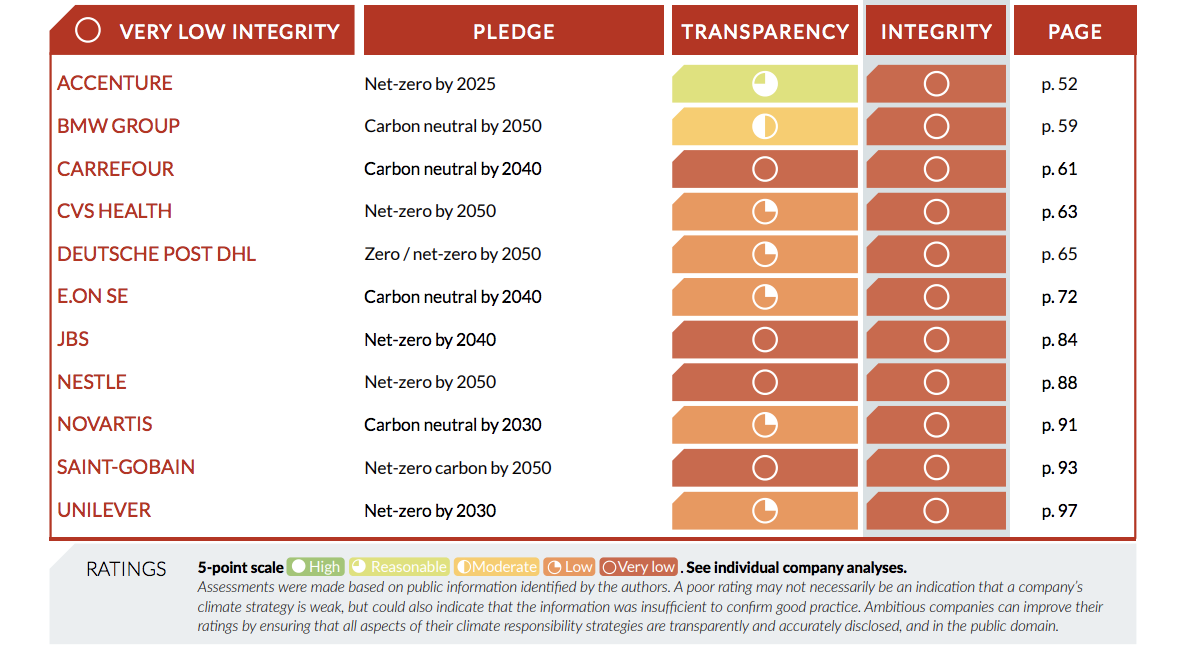
Some of the world's biggest companies — including those in the logistics industry — are falling short on their carbon neutrality targets according to a new research by NewClimate Institute.
The report said contrary to claims of these companies that they'll hit zero-emissions, data suggests that they will cut their carbon emissions by only 40% rather than 100%.
The Corporate Climate Responsibility Monitor conducted by the NewClimate Institute in collaboration with Carbon Market Watch evaluated 25 major companies worldwide to determine the "transparency and integrity" of these firm's headline climate pledges.
"The headline climate pledges of 25 of the world's largest companies in reality only commit to reduce their emissions by 40% on average, not 100% as suggested by their 'net zero' and 'carbon neutral' claims," the report said, adding that companies' headline climate pledges require detailed evaluation and in the majority of cases "cannot be taken at face value."
Thomas Day of NewClimate Institute, who compiled the report, said "only one company's net zero pledge was evaluated as having 'reasonable integrity'; three with 'moderate', ten with 'low' and the remaining 12 were rated as having 'very low' integrity" when it comes to their net zero pledges.
Amazon, Google, IKEA and Nestlé were among those reportedly failing to cut their CO2 emissions as fast as they claim.
Maersk tops integrity measure for net zero plans
In the logistics sector, the study included Maersk and Deutsche Post DHL which came at opposite ends of the spectrum, according to the report.
Maersk was found with "reasonable integrity" on its carbon neutrality pledge, while DHL was rated with "very low integrity."
"While none of the pledges have a high degree of integrity overall, Maersk came out on top, with reasonable integrity," the study said, noting that Apple, Sony and Vodafone followed with "moderate integrity."
It added, however, that majority of the companies with net zero or carbon neutrality pledges "fail to put forward ambitious targets."
"Many company pledges are undermined by contentious plans to reduce emissions elsewhere, hidden critical information and accounting tricks."


"Overall, the analysis finds the headline pledges of Amazon, Deutsche Telekom, Enel, GlaxoSmithKline, Google, Hitachi, IKEA, Vale, Volkswagen and Walmart have low integrity and those of Accenture, BMW Group, Carrefour, CVS Health, Deutsche Post DHL, E.ON SE, JBS, Nestlé, Novartis, Saint-Gobain and Unilever have very low integrity," the report added.
Near-term targets a "concern"
Day said near-term targets were of particular concern.
The report showed that the companies surveyed would only cut their emissions by about 23% on average by 2030, falling far short of the figure of nearly halving in the next decade that scientists say is needed to limit global heating to 1.5C.
"It's short-term action that’s the most important thing, in the climate crisis," he said, explaining that taken in aggregate, the efforts of the 25 companies studied would make little impact.
"It is not clear these reductions take us beyond business as usual," Day noted. "We were very disappointed and surprised at how much room for improvement there was [among the companies studied]. Companies need to be much more transparent about these goals."
The study noted that many of these large companies are relying on carbon offsetting for a large portion of their projected CO2 cuts — which is also one of the main reasons why most companies were marked down.
"Misleading advertisements by companies have real impacts on consumers and policymakers. We're fooled into believing that these companies are taking sufficient action, when the reality is far from it," said Gilles Dufrasne from Carbon Market Watch.
"Without more regulation, this will continue. We need governments and regulatory bodies to step up and put an end to this greenwashing trend."
Businesses are currently under pressure to reduce their environmental impact as talks of climate change gains traction. Companies in the supply chain industry have also been ramping up efforts to push for sustainability in the sector with both the aviation and shipping sectors adopting a net-zero carbon emissions goal by 2050 which is aligned with the Paris Agreement goal.
DHL responds to report
Responding to the report, DHL said "all these findings relate to the 2020 financial year, prior to the publication of our new, even more ambitious interim climate targets aiming towards net zero emissions in 2050."
"As far as we are aware, the Corporate Climate Responsibility Monitor does not take into account targets of companies that do not correspond to the rating scheme of this report. For example, the assessment of "Climate contributions and offsetting" does not take into account that offsetting does not play a role in setting our climate targets and measures and will therefore not play a role in the future," the logistics company told Asia Cargo News in a statement.
DHL explained that Deutsche Post DHL Group's targets for 2030, which it said are based on the Science Based Target Initiative, were also "not included" in one of the sections of the report, adding that by 2030, the Group aims to reduce its logistics-related emissions to 29 million tons (Scope 1, 2 and 3).
"To achieve the interim targets by 2030, the Group has adopted a package of measures worth up to €7 billion, primarily to expand the use of sustainable technologies and fuels in our fleets and buildings," DHL added. "Offsetting does not play a role in the calculation of our climate targets and measures."
The logistics firm also said the integrity of the Deutsche Post DHL Group's climate goals are also confirmed by "consistently good results" in ESG ratings and on customer platforms.



